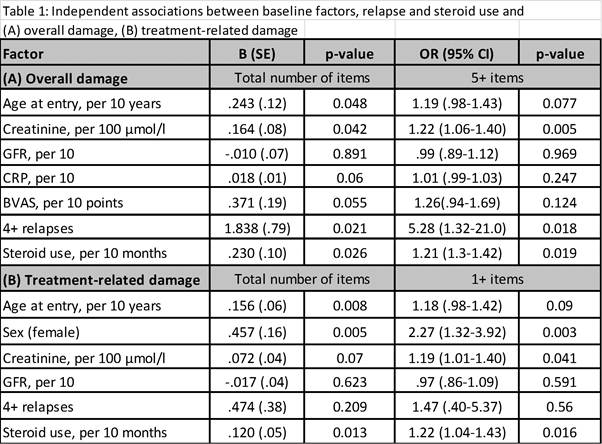Background/Purpose: Granulomatosis with polyangiitis [Wegener’s] (GPA) and microscopic polyangiitis (MPA) are antineutrophil-cytoplasm antibody associated vasculitides (AAVs). Damage is quantified by the Vasculitis Damage Index (VDI). Long term (up to 7 years) damage has been described for patients from four European Vasculitis Study Group (EUVAS) trials. The objective of this study is to determine the factors associated with long-term damage in the ANCA-associated vasculitides.
Methods: Data from N=535 patients from four EUVAS trials were studied. A long-term follow up (LTFU) questionnaire at 7 years post diagnosis was completed including VDI and glucocorticoid data. The associations between baseline (age, creatinine and BVAS scores) and follow-up data (number of relapses and duration of glucocorticoids) and damage over LTFU (total VDI scores and individual treatment related damage items) were explored. Multiple regressions were used to look for independent associations between baseline measures, cumulative factors and VDI scores at LTFU.
Results: 296 patients had steroid use and VDI data available at LTFU, with the mean length of use 40.4 (SD 16.7) months. On multiple linear regression, high levels of damage were associated with age at baseline (p=.048), serum creatinine (p=.042), number of relapses (p=.021), and cumulative glucocorticoid use (p=.026). Patients with a longer duration of glucocorticoid treatment [OR=1.21 per 10 months (95%CI 1.3 to 1.42), p=0.019] were more likely to have a total VDI score of ≥5 at LTFU.
Conclusion: Long term damage in the ANCA-associated vasculitides may be predicted by severity of initial disease, age, number of relapses and duration of steroids used; improvement in immunosuppressant therapies is therefore indicated.
Disclosure:
J. Robson,
GlaxoSmithKline,
5,
Nordic Pharma,
8;
H. Doll,
None;
R. Suppiah,
None;
O. Flossmann,
None;
L. Harper,
None;
P. Hoglund,
None;
D. Jayne,
Roche Pharmaceuticals,
2,
Genetech,
2,
Mitshubishi,
5,
Takeda,
5,
Roche Pharmaceuticals,
5,
Roche Pharmaceuticals,
8;
A. Mahr,
Laboratoire Francais de Biotechnologie,
9;
K. Westman,
None;
R. A. Luqmani,
None.
« Back to 2013 ACR/ARHP Annual Meeting
ACR Meeting Abstracts - https://acrabstracts.org/abstract/glucocorticoid-treatment-and-damage-in-the-antineutrophil-cytoplasm-antibody-associated-vasculitides/

